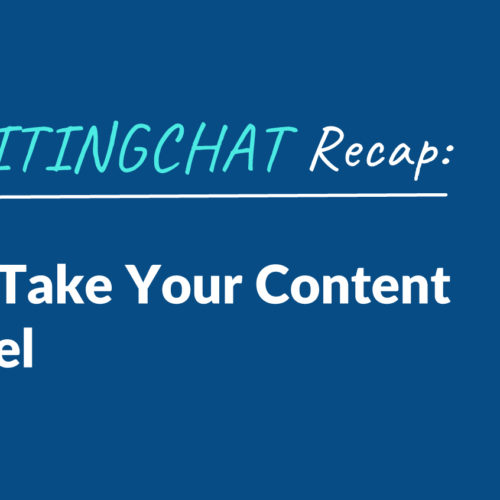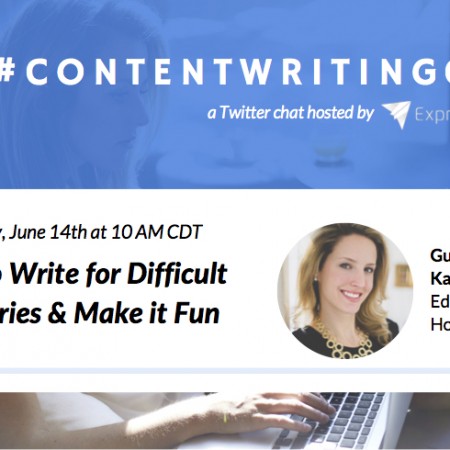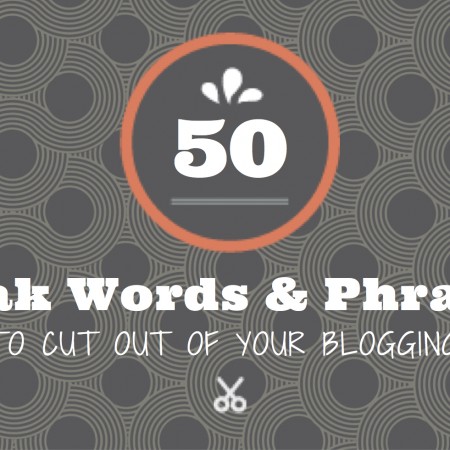#ContentWritingChat Recap: Writing Tips to Take Your Content to the Next Level with Michelle Garrett
Has your writing been feeling a little lackluster lately? Wondering how you can take it to the next level to create online content your readers will truly love? Well, you’re in the right place! This #ContentWritingChat recap is packed with helpful writing tips that help you improve your skills and create the best content possible. #ContentWritingChat Recap: Writing Tips to Take Your Content to the Next Level with Michelle Garrett Welcome to #ContentWritingChat! Today, we’re joined by @PRisUs! Michelle is a writer, blogger, and PR consultant. She’s here to share some writing tips that we can all use to take our online content to the next level! pic.twitter.com/aATvDPWGQW — Express Writers | Your Content Writing Team (@ExpWriters) August 6, 2019 Our guest host for this month’s chat was Michelle Garrett. She’s a writer, blogger, and PR consultant. Michelle has guest hosted #ContentWritingChat previously, so we were thrilled to have her with us again! Q1: When building a brand, why is great writing so important? Let’s face it… Some people just don’t see the value in high-quality content! Luckily for this Twitter chat community, we know just how powerful our content truly is. Here’s why: A1: The brand’s voice should carry through in writing across ALL channels – owned, paid & earned – so it’s important to be consistent and employ skilled wordsmiths who can bring that voice to life. #ContentWritingChat — Michelle Garrett (@PRisUs) August 6, 2019 The content you publish online communicates your brand’s voice. And as Michelle pointed out, you want to make sure it’s consistent across all the channels you’re using. Having guidelines for you and your team to follow can ensure everything is up to your standards and resonates with your target audience. A1) Writing is a major part of your brand; the voice, the tone, how people will find you, decide if they want to associate/do business with you, and so much more.#ContentWritingChat pic.twitter.com/U86R24seke — Jason Schemmel – Speaker & Podcaster #GSDChat ️ (@JasonSchemmel) August 6, 2019 Jason also feels your writing sets the voice of your brand. It also plays a role in how people find you and whether or not they decide to do business with you. A1: Great writing can: – Influencer your audience – Persuade them to take action – Educate them – Boost visibility on search engines and social media – Prove your authority and knowledge within the space#ContentWritingChat — Tamara (@itstamaragt) August 6, 2019 Tamara knows great writing makes a difference. She said it can help influence your audience, persuade them to take action, educate them on a topic, boost visibility in search engines, and position you as an authority in your field. A1 Why is great writing important in #branding? It helps ✏️define your voice ✏️share your message ✏️convey your values ✏️share your purpose ✏️tell your story ✏️communicate your USP ✏️engage your audience ✏️build thought leadership ✏️establish trust + more#ContentWritingChat — Bentley University (@bentleyu) August 6, 2019 Quality writing not only define your voice, but it’s essential to sharing your message, conveying your values, telling your story, and so much more! A1: Your writing can possibly be the first impression someone has of you and your brand. You don’t want to turn them off by sharing poorly written content, social media posts, etc. #ContentWritingChat pic.twitter.com/e5DQx27NAV — Netvantage Marketing (@netvantage) August 6, 2019 As Lexie mentioned, your writing is likely going to be the first impression someone has of your brand. If your content is of poor quality, that’s going to be a major turn-off. A1: Great writing is the first point of introduction of your brand’s ‘personality’ to the world. Poor writing, miscommunication, errors in spelling + grammar, and tone-deaf writing will alienate you from the readers or customers you want to reach. #ContentWritingChat — Rebecca Reynoso (@G2Rebecca) August 6, 2019 You want to make sure your writing is always top-notch. Make sure you’re effectively communicating your message and correcting any errors before publication. Don’t risk pushing your readers away due to mistakes that could be easily fixed. Q2: What makes a piece of online content so captivating that it grabs attention and keeps people reading? We know the content we publish is important. But how do we make sure that things like our blog posts are truly captivating to our readers? Keep these writing tips in mind if you need some help crafting appealing content: A2: I’d say you have to grab them early with a strong lede – you should spend as much time on that as anything. If you don’t draw them in early, they’ll move on to the next piece of content. #ContentWritingChat — Michelle Garrett (@PRisUs) August 6, 2019 Michelle knows that a strong lede is key to grabbing attention early on and drawing people into your content. You need to hook them from the start if you want them to keep reading. A2: First and foremost, the headline. Has it resonated with me? Piqued my curiosity, struck a cord of, “Whoa. That’s relevant!”? Once clicked in and reading, it has to deliver on the promise it stated in the headline that got me to click in the first place. #ContentWritingChat https://t.co/7AzNwYmHRi — ThinkSEM (@ThinkSEM) August 6, 2019 A great headline is always crucial. Since it’s the first thing someone will see from your content, you want to make sure it strikes a cord with your target audience. Just make sure you always deliver on what your headline promises. No clickbait! A2: Relevance. The topic has to be something that matters to the audience. Also, it has to be something different. Don’t just rehash information. Show me a new way of thinking or give me a piece of information I haven’t heard before. #ContentWritingChat https://t.co/Ot2DEKV4G8 — Jared Meade, MPS, APR, MPRCA (@Meadepr) August 6, 2019 And of course, one key to captivating content is to always create with your audience in mind. Make sure the topics you write about are relevant to your brand and appealing to those who will be reading … Read more





